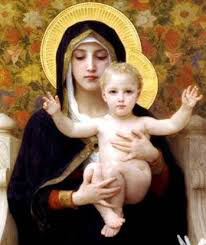
WelCom May 2023
Last month, WelCom began a series of exploring titles of Mary, the Mother of Jesus, in the Litany of Loreto which dates from 1531. The first was Mary as ‘Mirror of Justice’. Here are two more, placed in a context relevant to the experiences and aspirations of today’s Christians, by Fr James Lyons.
Seat of wisdom
James Lyons, Priest of the archdiocese
One of the Bible’s stories of wisdom is the judgement of Solomon in deciding the real mother of a child claimed by two women [1Kings 3: 16-28].
Solomon, coming to the throne after the death of his father, David, asked God for a heart to understand how to discern between good and evil (1 Kings 3: 9). He was blessed with wisdom because he had not asked for long life for yourself or riches or the lives of your enemies [vs 11].
Solomon’s praise of his gift is recorded in The Book of Wisdom:
she is a breath of the power of God;
pure emanation of the glory of the Almighty;
hence nothing impure can find a way into her;
she is a reflection of the eternal light;
untarnished mirror of God’s active power;
image of his goodness.
Wisdom 7: 25-26 [also Wisdom 7:10-11].
We usually understand the word ‘seat’ as a chair or a place to sit and rest. It also refers to a throne, a symbol of authority or status. A chairperson is the title of one who controls a meeting. The seat of Government is the city or region where a nation’s governing authority is located. The word ‘cathedral’ is from the Greek ‘kathedra’ or chair, and names the church in which is held the bishop’s symbol of leadership – the bishop’s chair.
Catholic tradition has looked to Mary, the Mother of Jesus, as Seat of Wisdom – the centre point of courage and good judgement who guides the followers of Jesus with gentle strength and wise counsel.
The Christian scriptures provide several examples of Mary’s wisdom. She had great discernment and knew how to reserve judgement, to wait for God. Let what you have said be done to me [Luke 1:38] is her statement of trust in God, a willingness to let God’s plan take its course.
The English poet, John Milton [1608–1674] writes that ‘Wisdom’s best nurse is contemplation’. Mary gladly treasured and pondered events and conversations in her heart, nursing them when their immediate meaning was beyond her [Luke 2: 20]. This practice led her to know Jesus better than any other. Confident in that knowledge, she had no hesitation in telling the Cana wedding servants to Do whatever he tells you [John 2: 5].
Later, in the panic and fear that followed the death of Jesus, she encouraged the apostles and, as they came to terms with his dying and rising, she gathered with them in prayer, re-uniting them after their abandonment of Jesus [John 19: 26-27; cf Acts 1: 14].
Mary is Seat of Wisdom, ‘image of the goodness of God’. She is the strong, inspiring, enabling comforter who understands our pain, heals our doubts, supports us in our weakness and encourages us to remain close to Jesus. She leads us to God through her own lived experience with God, in Jesus.
O Wisdom,
A gift from contemplation
Flowering into a tree of life
Harbouring uncertainty
Transforming doubt
With branches strong and true
Holding light with shade
A shelter for all.
Mary, Seat of Wisdom,
pray for us.
Cause of our joy
Joy has many causes. Success in exams, a friend’s visit, a thank you note, a job offer… Whatever contributes to our happiness, our security, our peace of mind, or heart, should also bring us joy.
Joy disperses worry and opens wide the door for hope.
The Christian story announces joy in its opening paragraphs. The angel brings news of great joy to shepherds during their night-time watch over the sheep. This joy, the shepherds are told is to be shared by the whole people. A child has been born, a saviour, and will be found wrapped in swaddling clothes and lying in a manger. [cf Luke 2: 10-11]
In his 2013 Encyclical Letter, The Joy of the Gospel – Evangelii Gaudium, Pope Francis stresses the universal goal of this news of great joy. It is ‘news’ which is ‘full of joy’ because it is meant for everyone. Those who respond to this news as Mary did, know they cannot keep it to themselves.
Our ‘joy’ comes through her acceptance of God’s call. She is, indeed, the cause of our joy and our inspiration ‘to go forth and preach the Gospel to all: to all places, on all occasions, without hesitation, reluctance or fear’. [EN n.23]
Pope Francis prays: [EG n.288]
Filled with Christ’s presence,
you (Mary) brought John the Baptist,
making him exalt in the womb of his mother.
Brimming over with joy,
you sang of the great things
done by God.
Standing at the foot of the cross
with unyielding faith
you received the joyful comfort
of the resurrection,
and joined the disciples awaiting
the Spirit
so that the evangelising Church might be born.
Give us the courage to seek new paths
that the gift of unfading beauty
may reach every man and woman.
As an adult, Jesus would speak of the joy of childbirth being so great as to render the mother’s earlier pain and anguish irrelevant. But his own birth signalled a joy for the whole world, not just his immediate family.
During the night that heralds Easter, the Church sings the Exsultet – a great hymn of praise honouring the Paschal Candle whose flame pierces the darkness of this holy night and announces the resurrection of Jesus:
The power of this holy night
dispels all evil, washes guilt away,
restores lost innocence, brings mourners joy.
Mary is Cause of our Joy for she is the mother of the one who is:
the Way to the Father
the Truth that sets us free
the Life that makes our joy complete.
